When we think of gambling activities, the first pictures that often come to mind are those of rotating roulette wheels, poker chips clattering on felt tables, and cubes rolling across a betting area. While many consider these activities as simple hobbies fueled by luck, a more profound exploration reveals a fascinating blend of tactics, skill, and community interaction that elevates them well beyond basic luck. Whether you are a seasoned player or a curious newcomer, grasping the subtleties of these games can significantly enhance your experience and appreciation.
Casino games have evolved over centuries, with different cultures contributing to their rich backgrounds and different forms. From the intricate tactics of blackjack to the deception methods in card games, players engage in a battle of wits as much as a gamble on numbers. This dynamic interplay between chance and skill creates a thrilling atmosphere that draws millions to casinos worldwide. As we explore the world of card activities, we will reveal the methods that can tilt the odds in your advantage and the community aspects that make these games a favored choice for entertainment and interaction.
A Strategy of Casino Games
Casino games frequently combine a mix of skill and chance, making them intriguing for players who like a challenge. Every title has its unique set of rules and tactics that can influence the results. For example, in titles like 21, participants are required to use strategies like counting cards and understanding the probabilities to make smart decisions. This expertise can significantly improve the victory potential, distinguishing seasoned players from novices who may rely solely on luck.
In contrast, titles such as the roulette may seem to be purely based on chance, but strategic thinking can also come into the equation. Players can select between various betting tactics, such as the Martingale system, in which they raise the bets after a loss. This approach can establish a more methodical approach to the activity. Grasping the odds of specific bets can also assist players make smarter decisions on the roulette table, demonstrating that even in titles of luck, strategy can enhance the enjoyment.
Additionally, poker stands out as a game that strongly focuses on strategy. In contrast to most casino games, the game of poker combines ability, psychology, and chance. Players must not only focus on the cards they are given but also take into account their rivals’ behavior and betting patterns. Mastering concepts like table position, pot odds, and reading bluffs is essential for success. This depth of strategy in the game of poker often creates to a more engaging experience for players, as their decisions and abilities significantly affect the game’s results.
Comprehending Probability and Ratios
In the world of casino matches, likelihood and ratios have a vital role in deciding a gambler’s possible outcomes. Every activity has its own collection of guidelines that dictate how the probability of winning or losing is calculated. For case, in games like 21, participants have a opportunity to influence their odds through strategy, whereas in games like the wheel, the results are purely governed by chance. Understanding how these probabilities are calculated can significantly affect how a player approaches the game.
Odds are typically shown in two formats: fractional and numeric. Fractional odds indicate the proportion of the amount gained to the sum bet, whereas decimal odds show the total return for a successful bet, which includes the initial bet. For instance, if a match has odds of 5 to 1, this implies that for every one unit staked, a player could win five units if successful. Learning how to understand these ratios enables players to assess their potential earnings and formulate more informed decisions during play.
Gamblers should also be conscious of the casino advantage, which is the casino’s built-in benefit over the gamblers. Each match has a different advantage, and understanding this concept is crucial for managing one’s hopes and funds. Games with a reduced house edge, such as 21 and chemin de fer, typically offer better odds for players compared to games like slots and keno. https://f168.com.co/ By understanding the connection between chance, odds, and the casino advantage, players can improve their gaming engagement and strategize more efficiently.
The Social Aspect of Casino Table Games
Table games at gaming establishments are often seen as a center of community engagement, bringing participants together in a collective experience that goes far beyond the mere act of gambling. The atmosphere at a poker table can be electric, with players engaging not only with the game itself but also with one another. Laughter, cheers, and, occasionally, friendly banter create connections that enhance the overall experience of the gaming experience. This communal aspect can turn a alone endeavor into a lively social event, making casino games particularly appealing.
One of the intriguing elements of table gaming is the way it fosters camaraderie among players. Whether it’s teaming up to defeat the dealer at a craps table or sharing stories between hands in a card game, the environment encourages interaction. Players often share advice or tactics, creating a sense of community that enhances the fun. This social dynamic can make new gamblers feel included and less daunted by the competitive nature of casino games. As the game continues, friendships may form, leading to a sense of connection that keeps players returning to the table.
Moreover, the social aspect of gaming at tables extends beyond just the participants. Dealers play a crucial role in encouraging interaction and maintaining the flow of the game. Their ability to engage players with friendly conversation and their expertise in managing the table can create an welcoming atmosphere. This relationship between players and staff adds another layer of enjoyment, where gamblers feel bonded not only to each other but also to the staff. Such interactions are often what make the experience unforgettable, as participants leave with tales to tell and relationships made, reinforcing the notion that table games are truly about more than just chance.

